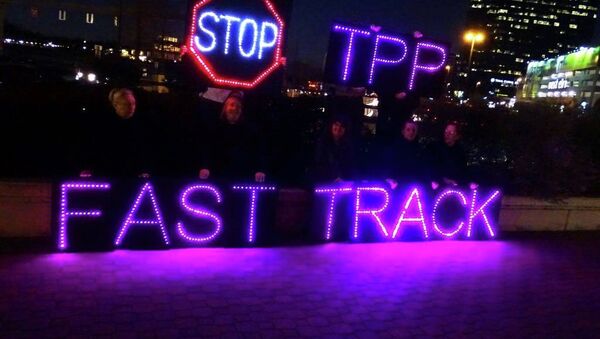The document — a letter from a TPP ministerial meeting of 12 countries in December 2013 — shows how any proposed TPP agreement would force state-owned enterprises (SOE) to act "on the basis of commercial considerations," while public institutions would be prohibited from favoring local businesses and services in purchases and sales.
Commercial Considerations 'Intrinsically Wrong'
The directive for SOEs to take into account "commercial considerations" has raised concerns among activists, who are worried that the quality of some vital public services may suffer as a result of obligations to meet commercial or financial targets.
RELEASE: Secret #TPP "State Owned Enterprizes" guidance and analysis https://t.co/rwN0wbTwVq pic.twitter.com/tDGisF7yuL
— WikiLeaks (@wikileaks) July 29, 2015
In an analysis of the document, Professor Jane Kelsey from the University of Auckland, New Zealand, says "totally US-driven" requirements would be "intrinsically problematic".
Professor Kelsey says that many institutions are state-owned "because they have functions other than those that are merely commercial, such as guaranteed access to important services, or because social, cultural, development and commercial functions are inextricably intertwined."
"Many SOEs at central, regional and local government levels provide basic services that have a public dimension, even when they have been converted into a corporate form. What does this mean for them?"
Developing Countries to Suffer
With SOEs prohibited from favoring local businesses under TPP proposals, there are fears that it will enable foreign multinationals to muscle in on markets all over the world, potentially resulting in a loss of jobs and profits for local communities.
The proposals may also give foreign companies the chance to sue SOEs in domestic courts for any perceived breaches of TPP structures, while countries and private companies may also be able to sue TPP governments if they are deemed to not have acted with adequate "commercial considerations".
WikiLeaks warns that developing countries that employ a large number of SOEs as part of its economic infrastructure, such as Vietnam, would be the worst affected, while even countries, such as Canada and Australia, would suffer.
Largest Companies Would Benefit
There has been widespread criticism of the proposed TPP agreement, which is a free trade deal being negotiated by up to 17 Pacific-rim countries, headed up by the United States.
If successfully negotiated, the TPP would account for 40 percent of the world’s GDP, while it’s thought that any agreement would be linked up with the similar TTIP and TISA deals to create a mega treaty package comprising of two-thirds of global GDP.
Oh yes: our Stop #TTIP ECI just reached 2.4 million! Let's keep this going; RT and sign at http://t.co/fP10U1MInP pic.twitter.com/VBUuakk6cB
— Stop TTIP (@eci_ttip) July 30, 2015
There are also significant concerns over the lack of transparency of negotiations, with highly secretive talks between world leaders held behind closed doors.
This has aroused more concern from the public, who are worried that any such agreement would merely benefit predominantly American multinational corporations and lead to a reduction in the quality of services around the world.
WikiLeaks' editor Julian Assange highly criticized the proposals contained within the leaked document.
"The TPP erects a 'one size fits all' economic system designed to advantage the largest transnational corporations.
"In this leak we see the radical effects the TPP will have, not only on developing countries, but on states very close to the center of the Western system. If we are to restructure our societies into an ultra-neoliberal legal and economic bloc that will last for the next 50 years then this should be said openly and debated."




